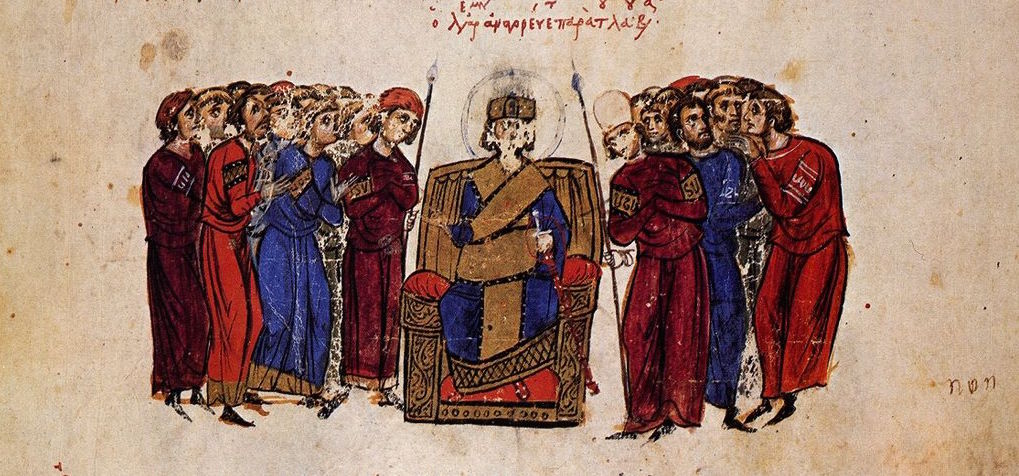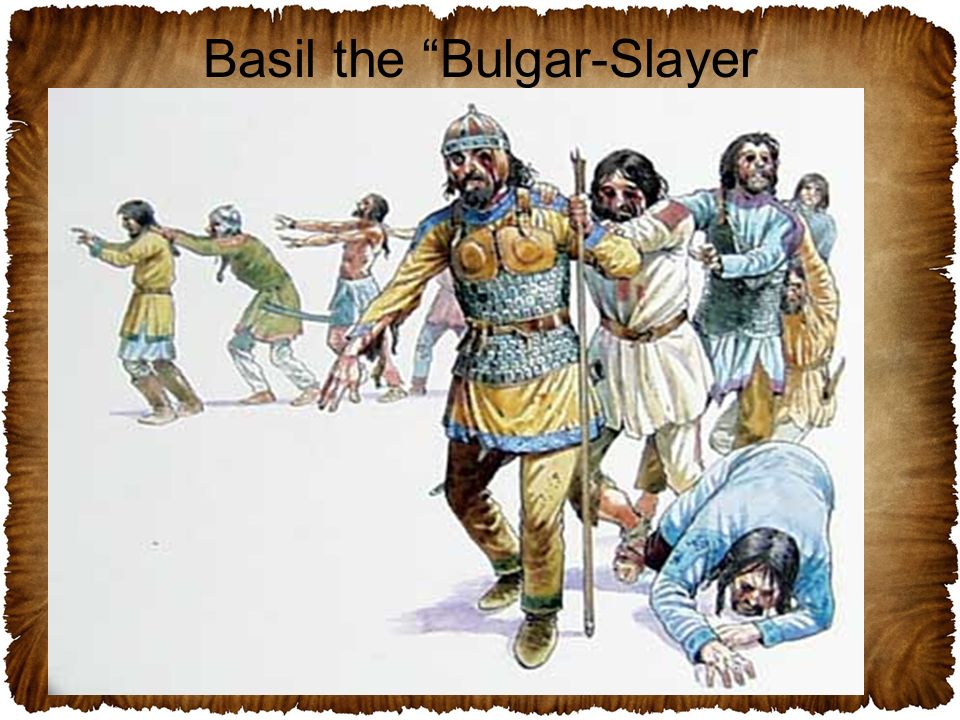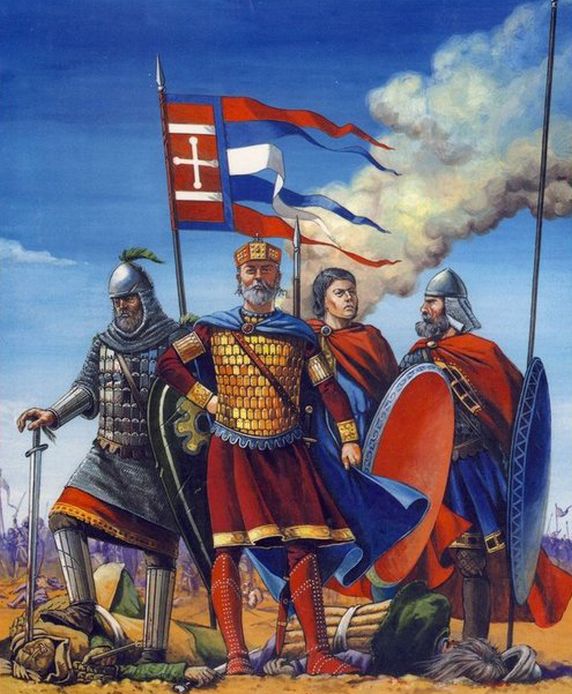Admiral:
[align=center] [/align]
[/align]
Byzantine (Mediaeval Eastern Roman) emperor Leo V (r. 813-820) has been deemed too clever by half by some students of history.
First he toppled the inept reigning emperor Michael I Rangabe by withdrawing his troops in the middle of an open field battle at Versinikia against the Bulgars, a battle that the Byzantines were in the process of winning (for similar reasons of organization and drill that made the ancient Romans excel at open field battles against foes such as Celts, Iberians and Germans). This resulted in a great slaughter of Constantinople’s army, whereupon Michael I resigned voluntarily, Leo seized power and had all Michaels’ sons gelded. The triumphant Bulgar army marched to Constantinople, sacrificing in full view of the city walls and demanding negotiations. The Bulgar Khan Krum entered into a meeting with Leo V, but spotted a sign that betrayed how Leo had filled his retinue with assassins. The attempt at the Khan’s life was botched, and fleeing slightly wounded back to his host, the enraged Khan burnt Constantinople’s suburbs, massacred populations across the southern Balkans and ravaged Byzantine lands. Some years of external peace and internal iconoclam then followed.
In 820, Leo had his former friend and military commander Michael the Amorian arrested on treason charges. Instead of just executing Michael swiftly, Leo concocted a scheme where Michael was to be tied to an ape and cast into a bathhouse furnace, to be either maimed by the monkey or die from burning or dehydration under the heated bathhouse floor. However Christmas got in the way, and Leo delayed with Michael’s punishment until after Christmas, whereupon Michael’s supporters gathered and assassinated Leo V.
Then Michael II ascended the throne as a man who was not tied to an ape and cast into a furnace.
Fuggit Khan:
Instead of just executing Michael swiftly, Leo concocted a scheme where Michael was to be tied to an ape and cast into a bathhouse furnace, to be either maimed by the monkey or die
Admiral
You gotta give the guy credit for creativity :hashut
Ghrask Dragh:
Wow!
Of all the things in all the world how the hell did he come up with that!?!
Abecedar:
And they think drugs are a new problem.
I do not want to try what he was on.
Dînadan:
Wow!
Of all the things in all the world how the hell did he come up with that!?!
Ghrask Dragh
Fairly sure there was an old Roman punishment that involved something like that; think it was something like the punishee was put in a sack with a monkey and a couple of other animals and then the sack was tossed in the Tiber.
Edit: yep, was a variety of animals and most common during Hadrian�?Ts reign was a cock, a dog, a monkey and a viper and it was the punishment for patricide - https://en.m.wikipedia.org/wiki/Poena_cullei
Does make you wonder if the animals were also guilty of patricide. ;P
Dînadan:

Admiral
That one at the front with the walking stick must be a king. ;P
Uther the unhinged:
Yeah Romans not the nicest but always imaginitive. The patricide law goes right back to the republic I think. Ciceros first big case was defending a guy against this charge and punishment ( bit harsh on the monkey but animal righrts were not big with the Romans).
As a corollary to the Varangian story, there is a story about a celtic (galatian) chiefs wife abducted and raped by a high ranking Roman. Evemtually ransomed, at the ransom once the money was paid at a river crossing on the border she was handed over by her abductor. Just after the handover she grabbed her husbands sword and killed her abductor ( deal was over all debts paid). When her husband said it was good to have her back she said yes but even better to have only one man alive who had slept with her.
Big on grudges the celts.
Trouble with the Romans they never quite got the poimt of cruelty. They were as above too imaginitive. Now the Mongols got it ( the horror, the horror, to misquote apocalyse now). Knowing they physically could not control an empire if it revolted, when a city revolted having accepted their rule it would pften be raised ( man, woman, child animal. All). What truly chills is the �?~banality of evil�?T its matter of factmess not its imagonation. During the crusade against the cathars in Southern France in the Early middle ages one town was taken. All inhabitants spught refuge in the cathedral. The forces taking the town went to the cardinal with a problem. How were they to know who was a �?~heretic�?T and who was not? His answer was simple, theologically spund but chilling. �?o Burn the lot of them. God will know his own.�?�. It is actually this form of cruelty ( the lack of any form of empathy and practical) that is far more scary than the imagonitive punishments of the Romans. Imagination recognizes the importance/humanity of the victim. This did not. Interestingly I wonder if the �?~imaginitive�?T punishment for patricide waa only for roman citizens. Non romans I suspect would just be killed as not worthy of imagination. I await correction by classicists.
Anyway to much wine ( did I just write that!) and morbid y thpughts . So time for bed.
Dînadan:
During the crusade against the cathars in Southern France in the Early middle ages one town was taken. All inhabitants spught refuge in the cathedral. The forces taking the town went to the cardinal with a problem. How were they to know who was a �?~heretic�?T and who was not? His answer was simple, theologically spund but chilling. �?o Burn the lot of them. God will know his own.�?�. It is actually this form of cruelty ( the lack of any form of empathy and practical) that is far more scary than the imagonitive punishments of the Romans.
Uther the unhinged
If this is the event I�?Tm thinking about, then this is actually mentioned in one of the Horus Heresy books and the act created an über-powerful daemon in the 40k universe (I�?Tm not familiar with the actual real life historical event, but it sounds like what the HH book alluded to when it described the act which created the daemon).
Anyway to much wine ( did I just write that!) and morbid y thpughts . So time for bed.
Apt for a discussions on Romans though.
 [/align]
[/align]
 [/align]
[/align]